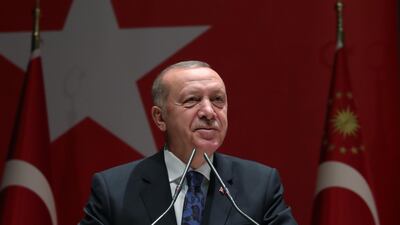Turkey could deploy troops to Libya to support the government in Tripoli as early as next month, President Recep Tayyip Erdogan said on Thursday, putting the north African country's conflict at the centre of wider regional frictions.
Libya's internationally recognised Government of National Accord (GNA) has been fending off a months-long offensive by Field Marshal Khalifa Haftar's forces in eastern Libya.
Last month, Ankara signed two separate accords with the GNA, led by Fayez Al Serraj, one on security and military cooperation and another on maritime boundaries in the eastern Mediterranean.
"Since there is an invitation [from Tripoli] right now, we will accept it," Mr Erdogan told members of his AK Party in a speech. "We will put the bill on sending troops to Libya on the agenda as soon as parliament opens."
The legislation would pass around January 8 or 9, he said, opening the door to deployment.

However, it was unclear what specific invitation Mr Erdogan was referring to, as the interior minister in the Tripoli-based government, Fathi Bashagha, suggested in comments to reporters in Tunis that no such official request had yet been made.
"If the situation escalates and then we have the right to defend Tripoli and its residents... we will submit an official request to the Turkish government to support us militarily so we expel the ghost of mercenary forces," Mr Bashagha said on Thursday.
For weeks Ankara has flagged the possibility of a military mission in Libya, which would further stretch its armed forces less than three months after it launched an incursion into north-east Syria against a Kurdish militia.
Turkey has already sent military supplies to the GNA despite a United Nations arms embargo, according to a UN report last month.
The Tripoli government and Field Marshal Haftar's Libyan National Army were not immediately available for reaction to Mr Erdogan's comments.
Mr Erdogan visited Tunisia on Wednesday to discuss cooperation for a possible ceasefire in neighbouring Libya. On Thursday, he said Turkey and Tunisia had agreed to support the GNA.
But on Thursday, the Tunisian presidency contradicted Turkey’s statement saying it maintained a neutral stance on Libya and would not be joining any coalition.
The statement directly referenced Mr Erdogan’s claims that Tunisia was in agreement over the situation, saying, "the false allegations about our position on Libya indicate miscalculation."
The statement added that Tunisia supports a peaceful solution to the conflict that will end the bloodshed.
The recent move has also sparked concern in Nicosia and Athens with the Greek government looking to other European states and the UN to condemn the move that would see Turkey and Libya annexe hundreds of kilometres of the Mediterranean Sea and carry out oil and gas exploration.
Greece’s Foreign Minister Nikos Dendias made a whistle-stop tour of Libya, Egypt and Cyprus this week to discuss the moves by Ankara. He met with Field Marshal Haftar, his Egyptian counterpart Sameh Shoukry and Cypriot Foreign Minister Nikos Christodoulides.
Moscow too has voiced concerns over a possible Turkish military deployment to Libya in support of the GNA.
Mr Erdogan has said Turkey will not stay silent over what he claims are mercenaries from the Kremlin-linked Wagner group supporting the LNA.
Mr Erdogan, without presenting evidence on Thursday, said that 2,000 Wagner Group mercenaries and 5,000 fighters from Sudan were on the ground in Libya.
Field Marshal Haftar's eastern-based LNA has been trying since April to take Tripoli from the GNA, which was set up in 2016 following a UN-brokered deal.
Turkish and Russian officials held talks in Moscow this week to seek a compromise on the issues of both Libya and Syria. Russia's Vedomosti said on Thursday the discussions had lasted much longer than the expected three days.
In Syria, Russia is an ally of Syrian President Bashar Al Assad while Turkey has backed rebels seeking his ouster during the more than eight-year civil war. The latest talks follow reports that Russian-backed attacks were forcing tens of thousands more Syrians to flee towards Turkey.
Turkey has also been ramping up efforts to strike deals with nations around the Mediterranean, where Ankara has been at loggerheads with Greece over resources off the coast of the divided island of Cyprus.

